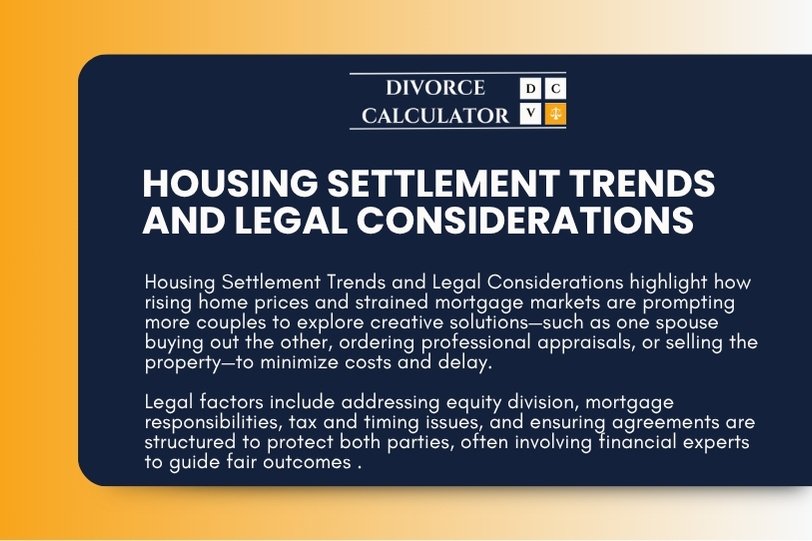When we talk about housing settlements, we refer to the legal process that resolves disputes between buyers, sellers, or other parties involved in real estate transactions. A housing settlement provides a formal agreement, often involving financial compensation or specific terms, that helps avoid lengthy court battles and gives clarity to all parties involved. Understanding how settlements work can help us make informed decisions and avoid costly mistakes.
Housing settlements can cover issues like property defects, contract disagreements, or problems with disclosure. By learning about the settlement process, we can protect our rights and ensure that our real estate deals are handled properly. This knowledge is essential for anyone involved in buying or selling a home.
Key Takeaways
We recognize that a housing settlement involves negotiation and agreement between parties, often to resolve disputes or clarify terms. This process helps us find mutually acceptable solutions without prolonged legal action.
Main elements of a settlement usually include:
- The parties involved
- The agreed-upon terms
- Deadlines for completing actions
- Conditions for compliance
In our experience, settlements can address issues such as rent disputes, maintenance responsibilities, or lease terminations. Each party should clearly understand their commitments as outlined in the agreement.
Key advantages for us include:
- Reduced legal costs
- Faster resolution times
- A more predictable outcome
We must carefully document settlements in writing, ensuring the language is clear and enforceable. It’s important that all parties retain copies for their records.
Typical Outcomes
| Outcome | Benefit |
|---|---|
| Payment plan | Eases financial burden |
| Early termination | Avoids future disputes |
| Policy changes | Reduces future conflict |
When entering a settlement, we should obtain legal advice if the situation is complex. This ensures our interests are represented and the agreement complies with housing laws.

Why It Matters In Divorce
When we face divorce, the issue of housing settlement often becomes central. The family home is usually one of our most valuable assets. Deciding what happens to it impacts both our finances and living situations.
A fair housing settlement affects our emotional well-being. Stability during a life transition is important, especially if children are involved. We need to consider how any arrangement supports a stable environment.
Here are key reasons housing settlement matters in divorce:
- Financial Security: The home may represent a significant part of our net worth.
- Debt Responsibility: We must decide who will take on any remaining mortgage or debts.
- Living Arrangements: Our future housing plans depend on these decisions.
| Aspect | Importance |
|---|---|
| Home Equity | Impacts division of assets |
| Mortgage Obligations | Affects credit and future loans |
| Children’s Residence | Provides stability and routine |
We also have to think about tax implications, which can vary depending on who keeps or sells the home.
By giving careful attention to this aspect, we increase the likelihood of fair and workable outcomes for all parties.
Real-Life Examples
We can look at several real-life examples to better understand housing settlements. Each example highlights different issues and outcomes.
Example 1: Westchester County, New York
In 2009, Westchester County reached a settlement with the federal government after being accused of failing to address housing segregation. The agreement required the county to build hundreds of affordable housing units and increase oversight of fair housing policies.
Example 2: Bank of America Settlement
In 2014, Bank of America agreed to a $16.65 billion settlement with the U.S. Department of Justice over accusations of misleading investors about mortgage-backed securities. Part of the settlement funds went to help homeowners avoid foreclosure and stabilize affected communities.
Key aspects of real-life settlements include:
- Construction or preservation of affordable housing units
- Financial compensation for affected residents or communities
- Policy changes or additional oversight requirements
| Settlement Name | Year | Main Focus | Outcome |
|---|---|---|---|
| Westchester County | 2009 | Fair housing compliance | New affordable housing units |
| Bank of America | 2014 | Mortgage-related issues | Financial aid and policy changes |
How States Handle Housing Settlement
Different states in the U.S. approach housing settlement with their own unique policies, resources, and challenges. Each state’s framework often addresses affordability, zoning, and legal enforcement in nuanced ways that affect both residents and developers.
New York
In New York, we face high population density and significant demand for affordable housing. The state utilizes regulations like the Housing Stability and Tenant Protection Act to provide stronger tenant protections and to curb rapid rent increases.
We also see incentives for inclusionary zoning in New York City, which requires developers to build or preserve affordable units in exchange for development rights. Local agencies such as the New York State Homes and Community Renewal (HCR) manage funding for low-income housing tax credits and oversee settlement agreements addressing allegations of discriminatory practices.
Key Features:
- Strong rent regulation laws
- Robust legal aid for tenants
- Active state and local housing authorities
- Mandatory affordable housing percentages in some developments
California
California emphasizes solving homelessness and creating diverse housing stock. We leverage tools like the Housing Accountability Act to limit local governments’ ability to block new housing, streamlining project approvals that align with state housing goals.
The state enforces settlement agreements with cities that fail to meet affordable housing targets, sometimes mandating specific numbers of units and periodic progress reports. We also support the use of accessory dwelling units (ADUs) to increase housing options on existing lots.
Policy Highlights:
- Enforcement of Regional Housing Needs Allocation (RHNA)
- State funding for housing through the California Housing Finance Agency
- Legal actions against cities for noncompliance with state law
- Promotion of ADU construction to meet density goals
Texas
In Texas, housing policy prioritizes both growth and flexibility. We often rely on market-driven solutions, with less centralized oversight compared to coastal states. Zoning decisions are made primarily at the city or county level, with significant variation across regions.
Settlement agreements tend to focus on compliance with fair housing laws and addressing disparities in access to new developments. Agencies such as the Texas Department of Housing and Community Affairs (TDHCA) oversee programs for low-income residents and disaster relief settlements.
Important Aspects:
- Decentralized policymaking and zoning
- Limited rent control and tenant protections
- Focus on fair housing compliance after litigation
- Emphasis on rapid permitting for new construction
Florida
Florida’s housing settlements often stem from disaster recovery efforts, especially after hurricanes or flooding events. We use programs like the State Housing Initiatives Partnership (SHIP) to distribute funds and services for both immediate and long-term needs.
We also negotiate settlements with developers to promote affordable housing, particularly in rapidly growing urban areas. Special attention is given to seniors and low-income families through targeted grant programs and tax incentives.
Program Elements:
- Disaster-related housing recovery funding
- Local governments negotiating for inclusion of affordable units
- Tax credits for senior and low-income housing
- Quick-response mobile housing programs post-disaster
Tips If You’re Dealing With Housing Settlement
If we notice signs of settlement, such as cracks in the walls or uneven floors, it’s important to document all changes. Taking dated photos gives us a clear record for any future discussions.
We should contact a qualified structural engineer or building inspector to assess the severity of any settlement. Their evaluation can help us understand the necessary repairs and possible risks.
Here are some practical steps we can take:
- Monitor Changes: Keep a log of new or widening cracks.
- Check Drainage: Ensure water drains away from the foundation to reduce the chance of soil-related problems.
- Limit Moisture: Avoid overwatering gardens near the home’s foundation.
| Common Issue | Recommended Action |
|---|---|
| Minor Wall Cracks | Monitor and fill |
| Stuck Doors/Windows | Check for frame shifts |
| Sloping Floors | Schedule a professional inspection |
If repairs are required, we should use licensed and insured contractors. Requesting documentation and clarifying warranty terms protects us from future issues.
It’s wise to inform our home insurance provider about any significant structural repairs. They may have additional requirements or offer advice tailored to our policy.
Frequently Asked Questions
We address specific processes and legal factors relevant to housing settlements. Various topics include common legal considerations, calculation of damages, historical contexts, and the mechanisms of lotteries and loan dispute resolutions.
What is the Settlement Housing Fund lottery and how does it work?
The Settlement Housing Fund lottery allows applicants to enter for a chance to lease or purchase affordable housing units. We usually submit an application during an open lottery period, after which winners are chosen randomly.
Applicants must meet specific income and household requirements. Selection does not guarantee a unit; it determines eligibility for further screening.
What factors determine the amount of a lawsuit settlement against a housing authority?
Factors include the extent of financial loss, emotional distress, and violation of rights. Courts often consider the impact on our housing stability and whether there was a pattern of discriminatory behavior.
Documentation supporting our claims, such as records of denied housing or correspondence, can influence the settlement amount.
What are the implications of emotional harm in housing discrimination cases?
Emotional harm, such as distress or anxiety caused by discriminatory practices, can lead to additional compensation in settlements. Courts may review statements describing the emotional impact on us.
Medical records or mental health evaluations can provide further support when seeking damages for emotional harm.
How are damages typically calculated in housing discrimination cases?
Damages include out-of-pocket expenses, lost housing opportunities, and compensation for emotional distress. We base calculations on actual financial losses and, where applicable, expert testimony.
Punitive damages can also be awarded if the offender’s conduct was particularly egregious.
What was the historical significance of settlement houses in urban areas?
Settlement houses supported immigrants and low-income families in cities during the late 19th and early 20th centuries. We benefited from services such as education, job training, and social activities at these centers.
These institutions played a key role in community development and social reform.
What are the typical terms for settling a housing loan dispute?
Typical terms include loan modification, reduced interest rates, or a payment plan. Sometimes, a lump-sum payment may resolve outstanding debts.
We often agree on new terms in writing to prevent future disputes and ensure both parties fulfill their obligations.



